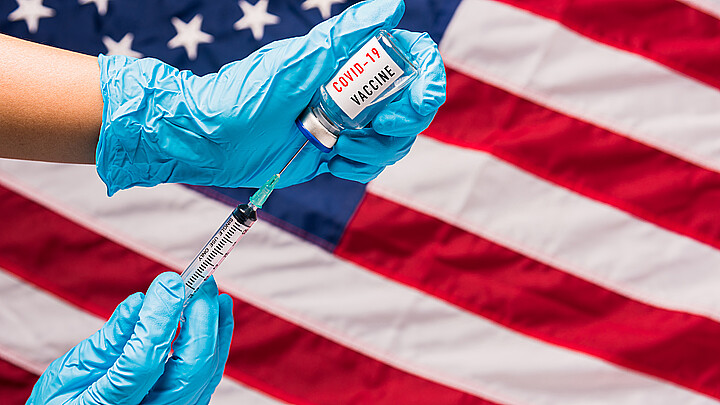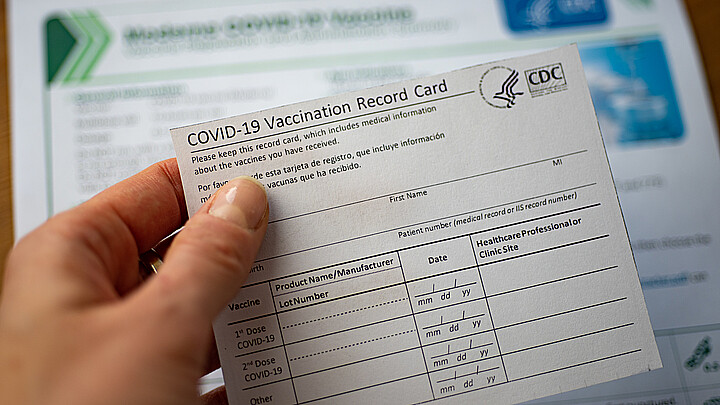Coronavirus
Under political pressure, FDA pledges to lower COVID vaccine standards for kids under 5
Neither agency nor House COVID subcommittee provides evidence of benefit versus risk of adverse events for kids
May 9, 2022 11:37pm
Updated: May 10, 2022 12:32pm
The FDA's vaccines chief said the agency wouldn't reject a COVID-19 vaccine for children under 5 "solely" because its efficacy against symptomatic infection was lower than 50%, according to the chair of the House Select Subcommittee on the Coronavirus Crisis.
The office of Democratic Rep. James Clyburn of South Carolina said Peter Marks, director of the FDA's Center for Biologics Evaluation and Research, made the pledge in a Friday staff briefing. The 50% efficacy threshold is in a June 2020 FDA guidance document.
"If these vaccines seem to be mirroring efficacy in adults and just seem to be less effective against Omicron like they are for adults, we will probably still authorize" because they nonetheless reduce the risk of severe disease in the mildest COVID variant, Marks said, according to the subcommittee's notes. "Some protection" is worth a quicker approval.
It's the second time in two weeks the South Carolina Democrat has publicly pressured the agency to quickly grant emergency use authorization (EUA) for this age group, despite reservations about the quality of evidence both internally and from outside experts.
Clyburn demanded a briefing following Politico reporting that the agency was leaning toward waiting until Pfizer's three-dose vaccine, an updated formulation of its disappointing two-dose vaccine, was ready this summer before approving Moderna's two-shot vaccine, which also failed to exceed 50% efficacy.
The agency reportedly thought approving them simultaneously would increase uptake, but Colorado Gov. Jared Polis (D) said it was "immoral" for the FDA to not rush a vaccine.
Clyburn's office declined to tell Just the News what evidence supported its view that the risk of severe outcomes from COVID for children under 5 was higher than the risk of adverse events from vaccination. "We didn't get into this area" with Marks, Press Secretary Graeme Crews acknowledged in an email.
A government study of New York children found Pfizer's vaccine efficacy against infection turned negative for 5-11 year-olds, though it still recommended vaccination to protect against "severe disease." According to CDC seroprevalence data, about 75% of children 0-17 had natural immunity in December.
The FDA didn't directly respond to Clyburn's characterization of Marks' briefing, which appeared to suggest the agency accepts lower standards for a population already at very low risk for serious COVID complications.
The agency also didn't answer Just the News questions about the benefit of a low-efficacy vaccine for children versus the risk of adverse reaction and whether the agency might limit vaccine availability to high-risk children.
The agency's Vaccines and Related Biological Products Advisory Committee will meet next month to discuss Novavax's EUA application for its over-18, non-mRNA vaccine, which reported no cases of "even moderate" illness in a 30,000-person trial. VRBPAC will then hold three meetings to discuss Pfizer and Moderna EUAs for children under 5.
VRBPAC member Paul Offit, a skeptic of both COVID boosters for young people and a possible annual booster shot, didn't respond to Just the News queries about Marks' briefing.
FDA press officer Abby Capobianco pointed Just the News to Marks' interview with The Washington Post promising not to delay consideration of Moderna's two-dose vaccine for children under 5, which followed the Politico report, and the VRBPAC meeting schedule.
She also highlighted an April 29 video for the agency's jazzy "Just a Minute" series, in which Marks emphasized "children are not small adults."
He said the FDA had to wait until vaccine makers submit "all necessary information" to evaluate whether "the vaccine works and is safe" by reviewing adverse events and replicating "key analyses." The FDA's review will be "timely" but not "cut any corners," he promised.
Marks gave similar caveats in the subcommittee briefing, according to the notes. He said the agency's review could be faster but cited more "complexity" in vaccines for children, who can experience severe outcomes from common side effects in adults, and "tons of immunogenicity data" to review from new variants.
The official's reported remarks drew scorn from some medical professionals.
"After Peter Marks throws away the efficacy standard for kids vaccines, and despite 75% of kids already having had COVID, liberal blue preschools will immediately mandate" any approved vaccine for children under 5, University of California San Francisco epidemiologist Vinay Prasad tweeted.
Johns Hopkins medical professor Marty Makary, a National Academy of Medicine member, agreed. "Concerning that FDA is suggesting they may be ok with a largely ineffective child vaccine," Makary tweeted. "Science, not consumer demand, should drive FDA decisions."
"The same Peter Marks who loftily claimed he would resign if the Trump administration rubber stamped the original vaccine approvals now breezily says it doesn't even matter" whether a vaccine meets the agency's "lenient" 50% efficacy standard, Ra Pharmaceuticals Chief Medical Officer Ramin Farzaneh-far tweeted.
The feds recognize a higher risk of adverse events following COVID vaccination in some demographics, especially young men, but publicly promoting such research can earn social media sanctions.
University of California Davis physician resident Tracy Beth Hoeg said Twitter locked her out of her account for several days for promoting an MIT study that found COVID vaccination was "significantly associated" with a jump in heart problems for 16-39 year-olds in Israel.
Twitter applied its "misleading" label (which prevents replies, likes and shares but not quote-tweets) to a tweet by another account that called attention to the study, published in the Nature journal Scientific Reports.
When Hoeg criticized Twitter for censoring that tweet, it marked her tweet misleading as well. (It also may appear as "stay informed.") She, Prasad and Makary participated in the inaugural Academy for Science and Freedom conference this year.
Twitter didn't touch a tweet by Just the News on its coverage of the study, nor by Brown University epidemiologist Andrew Bostom sharing the study's findings. The company, which recently sanctioned many COVID contrarians' accounts, didn't respond to queries for an explanation.










